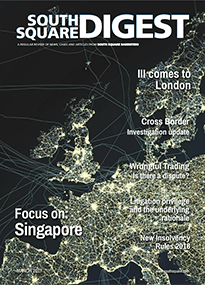

William Trower QC and Edoardo Lupi review the options available to foreign office-holders seeking information in England and the options available to English office-holders seeking information abroad
Introduction
During the course of his judgment in Re Rolls Razor Ltd,1 Buckley J said that powers conferred on the court by the predecessor to section 236 of the Insolvency Act 1986 (‘IA 1986’) were directed towards helping a liquidator to: “discover the truth of the circumstances connected with the affairs of the company, information of trading, dealings, and so forth, in order that the liquidator may be able, as effectively as possible, and, I think, with as little expense as possible…to complete his function as liquidator.” The observations made by Buckley J in 1968 are as true today as they were then, although they now of course extend to administrators as well as liquidators. The underlying principles apply not just in a domestic context, but also in the context of cross-border investigations, both where foreign insolvency office holders are seeking information in England and where English insolvency office holders are seeking information abroad. As the complexity and sophistication of cross-border dealings continue to increase, there is a growing need, where insolvency supervenes, for all insolvency office-holders to make full use of the armoury of powers available in English law to assist them in obtaining the information they require. There are many different situations in which a foreign office-holder may need to call on the assistance of the English court. They range from situations in which the English court has made orders for the examination of a former English based professional adviser by an Australian office-holder to be conducted before an Australian judge according to Australian law 2 to cases in which BVI joint liquidators have obtained orders for the production of certain documents from the English administrative receivers of certain related companies. 3Many of the cases which have been decided since 1986 have arisen under the co-operation provisions contained in section 426 of IA 1986. More recently, the English court’s approach to assisting foreign office-holders with information gathering has been explained and developed by the decision in Singularis Holdings Ltd v PricewaterhouseCoopers, 4 where, in the absence of a relevant statutory power, the Privy Council recognised a power at common law to assist a foreign court of insolvency jurisdiction by ordering the production of information in oral or documentary form which is necessary for the administration of a foreign winding up. This newly discovered power of assistance was said to exist “for the purpose of enabling those courts to surmount the problems posed for a worldwide winding up of the company’s affairs by the territorial limits of each court’s powers.” 5 In addition to inward requests from foreign office-holders seeking to obtain information in England and Wales, an English office-holder will often need to obtain information in the form of documents situated abroad or from individuals resident overseas. This is because English law has always regarded the English statutory insolvency scheme as having worldwide, not merely territorial effect, even in relation to a foreign company subject to an English insolvency proceeding6 . In these circumstances, the English court may request assistance from the relevant foreign court based, for example, on a reciprocal provision to section 426 IA 1986. To the extent that requests of this sort engage questions of foreign domestic law they are not dealt with further in this article. There is, however, a further possible avenue for office-holders seeking the assistance of the English court to obtain information abroad, namely, reliance on an extraterritorial order of the English court without resorting to international arrangements, or the domestic law of the foreign country. The court’s jurisdiction to make orders with extraterritorial effect under the IA 1986 to assist an office-holder to obtain information overseas is not settled. The most recent decision in this area7 suggests that the English court’s power to order the production of documents under section 236(3) IA 1986 may be exercisable in respect of documents situated abroad, even if the power under section 236(2) cannot be exercised to summon persons resident overseas to be examined in this jurisdiction.
Section 236 of the Insolvency Act 1986
A range of powers under the IA 1986 are available to office-holders. 8 The focus of this article is the statutory powers conferred on the English court under section 236 IA 1986 to assist an office-holder to obtain information. These powers have been described in the leading case as ‘extraordinary’, 9and to be inquisitorial in nature. 10Under section 236 the court is entitled to grant relief to the officeholder11in respect of the three categories of person mentioned at section 236(2)(c), including the broad category of any person whom the court thinks capable of giving information concerning the promotion, formation, business, dealings, affairs or property of the company. The relief available to the court is to: (a) summon a relevant person to appear before it for an examination under oath; (b) order a relevant person to submit to it an account of his dealings with the company; and (c) require the relevant person to produce any books, papers or other records in his possession or under his control relating to the company or concerning the promotion, formation, business, dealings, affairs or property of the company. These powers are conferred to assist officeholders to obtain information required to carry out their statutory duties and functions. 12 The office-holders’ functions include collecting in the company’s assets, realising them and distributing the net proceeds, investigating potential legal claims, and probing the reasons behind the company’s failure, including the former directors’ conduct. The principles according to which the English court grants relief under section 236 IA 1986 are well established. They are set out in the leading case of British & Commonwealth Holdings plc (Joint Administrators) v Spicer & Oppenheim.13The court’s discretion is unfettered but it is required to carry out a careful balancing exercise of the factors involved. First, it asks itself whether the office-holder reasonably requires the information to carry out his task. The office-holder’s view as to whether information is reasonably required is entitled to a good deal of weight.14 Second, in carrying out the balancing exercise, the court will be astute to avoid making an order which is wholly unreasonable, unnecessary or oppressive. Distinguishing between the powers available to it under section 236, the court has recognised that an order for production of documents is much less likely to be oppressive than an order for the private examination of the respondent.15 In addition, it will ordinarily be oppressive to order the examination of an examinee against whom the office-holder has already commenced proceedings.16
The Foreign Office-Holder’s Options
A foreign office-holder seeking to gather information relating to the insolvent company within the jurisdiction of the English court may rely on one of the following sources of crossborder insolvency law, depending on the particular facts of the case and the availability of the regime. Some but not all of these sources of law enable the office-holder to rely on the broad powers under section 236 IA 1986 set out above: (a) Section 426 IA 1986. (b) The UNCITRAL Model Law as incorporated into English law by the Cross Border Insolvency Regulations 2006 (‘CBIR’). (c) The EU Regulation on insolvency proceedings (the ‘Insolvency Regulation’). 17 (d) The common law as explained in Singularis Holdings Ltd v PricewaterhouseCoopers. 18
Section 426 of the Insolvency Act
This is perhaps the most flexible option for foreign office-holders seeking the assistance of the English court in the conduct of their investigative role. Under section 426(4) IA 1986 the English court is under a duty to assist the requesting court of a relevant country or territory. The court is entitled to apply in relation to the matters specified in the request either English insolvency law or the corresponding insolvency law of the relevant country or territory. Section 426 IA 1986 only applies, however, to the Channel Islands and the Isle of Man or any other country or territory designated as such by the Secretary of State.19 The designated countries or territories are made up principally of former or present members of the Commonwealth.20 On the application of a foreign office-holder, the court of a relevant country or territory may issue a letter of request seeking the assistance of the UK court under section 426. The request by the court of the relevant country or territory is authority for the UK court to apply either its own insolvency law or the insolvency law of the relevant county or territory and, in either case, its own jurisdiction and powers.21 The UK court has a discretion over whether to assist the requesting court (despite the mandatory wording of section 426(4)) and, if so, under which system of law.22 Ordinarily, however, the request by the court of the relevant country or territory will be a weighty factor in favour of the UK court exercising its discretion, 23 provided that it has not been vitiated by, say, some non-disclosure by the office-holder before the requesting court. 24 The office-holder therefore has a choice whether to apply for relief pursuant to section 236 IA 1986 or according to the law of the requesting country. The flexibility this choice affords the office-holder is well illustrated by the English court’s decision in the leading case of England v Smith25 , a case which arose out of the insolvency of an Australian company, Southern Equities Corporation Ltd. In England, the Australian liquidator obtained an order from the English Court of Appeal pursuant to section 426 IA 1986 for the examination under Division 1 of Part 5.9 of the Australian Corporations Law of the company’s former English based accountant by a specialist Australian judge. The liquidator had already commenced proceedings against the accountant’s firm. The practice of the Australian and English court in relation to private examinations diverged in one important respect. The evidence before the court showed that the Australian practice was to permit an examination even where the office-holder had already commenced proceedings against the examinee, subject to the judge’s control of the examination to prevent oppression. As noted above, the established practice in England is to refuse to order an examination under oath in such circumstances because the examination would amount to an unfair litigation advantage such as to be oppressive. Notwithstanding the divergent practice, Morritt LJ said that the relevant ‘insolvency law’ of Australia, section 569B of the Corporations Act, included the principles in accordance with which the Australian court exercised its jurisdiction under that provision. 26To circumscribe the operation of the Australian provision with reference to the limitations imposed by the English court’s practice in relation to section 236 IA 1986 would deprive section 426 of much of its intended effect. The Australian provisions had their own means of avoiding oppression, namely, their emphasis on the judicial supervision of the examination. The flexible approach taken in respect of section 426 IA 1986 in England v Smith was followed in Re Duke Group Ltd. In the latter case, an Australian liquidator obtained an order pursuant to section 426 IA 1986 for the examination of various respondents by an Australian judge under section 541 of the South Australian Companies Code. All of the respondents worked in Poland and one of them lived in Poland. Jonathan Parker J was prepared to order the examination of the respondents where the practice of the English court in the circumstances disclosed by the evidence would have been to refuse to make an order under section 236 IA 1986 on the grounds of oppression. Despite counsel for the respondents raising a question of jurisdiction as to the court’s power to summon the Polish based respondent, the judge nevertheless ordered the examination on the basis that the particular respondent had accepted service and had appeared on earlier hearings of the application.
The Model Law
Where the foreign insolvency proceeding has been recognised by the English court as a foreign proceeding under the CBIR, the court has the power pursuant to article 21 to grant any appropriate relief where necessary to protect the assets of the debtor or the interests of the creditors. Relevantly, upon recognition of the foreign proceeding, whether as a foreign main or nonmain proceeding, the court is empowered to grant the following relief on an application by the foreign representative under article 21(1): (i) to provide for the examination of witnesses, the taking of evidence or the delivery of information concerning the debtor’s assets, affairs, rights, obligations or liabilities (article 21(1)(d)); and (ii) to grant any additional relief that may be available to a British insolvency office-holder under the law of Great Britain (article 21(1)(g)). Where the relief is sought by a liquidator in non-main proceedings the investigation must relate to assets which (under the law of Great Britain) should be administered in those proceedings or concerns information required in those proceedings 27 . In Re Chesterfield United Inc, 28 Newey J considered the relationship between articles 21(1)(d) and 21(1)(g) in the context of an application by the joint liquidators of two companies registered in the BVI, who applied for the production of documents from Deutsche Bank AG. Rejecting the respondent’s submissions, the judge said that neither article 21(1)(d), nor the limiting words under article 21(1) (“where necessary to protect the assets of the debtor or the interests of the creditor”) significantly curtail the court’s ability to grant relief under section 236 IA 1986, on which the liquidators could rely via article 21(1)(g). Article 21(1)(d) was intended to set a common minimum standard, regardless of whether the office-holder would be entitled to seek such relief under the local law. The usual British & Commonwealth test of whether the documents were reasonably required by the office-holders to carry out their functions applied to the liquidators’ application. By contrast with the position under section 426 IA 1986, the present state of English law is that a foreign representative making an application under article 21 is not entitled to relief which would not otherwise be available to the English court when dealing with a domestic insolvency. 29 It is not, however, clear whether this restrictive approach to the construction of article 21 would be applied in circumstances similar to England v Smith, where the application of Australian law led to a different result from that which would have been reached in England not because of differences in the substantive jurisdiction, but because of differences in the way in which an Australian court and an English court would have exercised that jurisdiction. In any event, the ability of the English court to apply foreign law and procedure under section 426 is a consideration office-holders would do well to keep in mind where both section 426 and the Model Law are available to them, particularly where the practice of the English court in the circumstances of the case would ordinarily be to refuse relief under section 236 IA 1986.
The Insolvency Regulation and the PostBrexit Position
An office-holder appointed in main proceedings is entitled to exercise in the UK all of the powers conferred on him by the law of the state of the opening of proceedings (article 18(1)) 30 ; this will extend to his investigatory powers. Likewise, under article 25 of the Insolvency Regulation31 , a judgment by the courts of the main proceedings which derives directly from insolvency proceedings and which is closely linked with them is recognised automatically across EU members states and is enforceable pursuant to articles 38 to 58 (except article 45(2)) of the Regulation on Civil Jurisdiction and Judgments (44/2001) 32 . This will include court orders designed to assist an insolvency office-holder in his investigation of the affairs of the insolvent debtor. Thus an order of the English court pursuant to the bankruptcy equivalent of section 236 IA 1986 has been said by the Supreme Court of the Netherlands to fall within article 25. 33 The same principle should apply to an order for the disclosure of information made in secondary proceedings, so long as the information sought relates to assets situated in the territory of the member state which opened those proceedings 34 . The position may change, however, when the UK eventually completes the process of withdrawal from the EU, because the Insolvency Regulation35 may no longer form part of English law. If and when that occurs, European office-holders will, subject to recognition, still be able to rely on the CBIR. With one exception they will not be entitled to rely on section 426, given that, apart from the Republic of Ireland, no other EU member state has been designated as a relevant country or territory by the Secretary of State. There is a further possibility that European office-holders might choose to rely on the specific common law power of assistance outlined further below. Of greater concern going forward is the position regarding requests by English officeholders seeking to exercise investigative powers abroad, and the enforceability of the English court’s orders under section 236 IA 1986 across the EU. Only a handful of EU member states have enacted the Model Law. 36 Reliance may have to be placed on the domestic law arrangements of each member state in which recognition and assistance are sought. In these circumstances, just as European officeholders may increasingly need to rely on the common law power of assistance as regards inward requests, English office-holders may find themselves having to rely on any equivalent principles in other European states, and possibly, (to the extent that such a jurisdiction exists as to which see below), the English court’s jurisdiction to make extraterritorial orders under section 236 IA 1986.
Common Law Power of Assistance
If foreign insolvency office-holders are not entitled to rely on any of the above regimes to seek the English court’s assistance in obtaining information, they may be able to rely on the English court’s common law power to assist a foreign court of insolvency jurisdiction by ordering the production of information in oral or documentary form which is necessary for the administration of a foreign winding up37 . The nature and extent of this jurisdiction was explained in the Privy Council’s decision in Singularis Holdings Ltd v PricewaterhouseCoopers 38 in which it was stressed that this newly discovered power of assistance was subject to a number of important limitations, two of which are particularly relevant for present purposes. First, the common law power does not enable the office-holders to do something which they could not do by the law under which they were appointed. Secondly, the order sought must be consistent with the substantive law and public policy of the assisting state. 39 The important practical consequence of this second limitation is that the power cannot be exercised in England as a mode of obtaining material for use in actual or anticipated litigation, because that is a matter governed by rules of forensic procedure which insolvency office holders must accept like all other litigants 40 . This means that the English common law power does not extend to the grant of relief in the types of circumstances under consideration in England v. Smith, 41 where the litigation in Australia was already anticipated. By setting these limitations, the majority thereby rejected the proposition for which Cambridge Gas 42 had appeared to be authority that an assisting court has a common law power to assist the foreign court by doing whatever it could have done in a domestic insolvency. 43 It follows that decisions like In re Phoenix Kapitaldienst GmbH, 44 where the court held that a German office-holder could rely on section 423 IA 1986 by virtue of the court’s common law power of assistance, in circumstances where none of the Insolvency Regulation, the Model Law nor section 426 IA 1986 applied, were wrongly decided, because they involved ‘an impermissible application of legislation by analogy’. 45 Despite these limitations, the recognition of this specific common law power of assistance in the context of information collection demonstrates the common law’s dynamism and ability to adapt to meet the challenges posed by cross-border insolvencies. This common law power may yet prove to be of importance to office-holders seeking to obtain the English court’s assistance to carry out the task of information collection post-Brexit.
Extraterritorial Effect of section 236
What then are the options available to the English court seeking to assist an office-holder to obtain information beyond the territorial limits of its jurisdiction in circumstances where there are otherwise no sources of cross-border insolvency law on which the office-holders can rely, and the domestic law of the relevant country does not provide any assistance? One possibility is that the English court might recognise that some of its powers under section 236 IA 1986 have extraterritorial effect, leaving it to its own discretion to keep the use of such powers within reasonable bounds. A number of other provisions of the IA 1986 are settled as having extraterritorial effect, but the position as regards section 236 is far from clear. 46 As H.H. Judge Pelling QC, sitting as a judge of the High Court, said in a recent case involving an application under section 236 for the production of documents situated in Thailand,“the extra-territorial effect of that provision [section 236] is much less straightforward because there are two conflicting High Court decisions concerning that issue”. 47 Before turning to those two High Court decisions, it can be seen that the tension in the authorities on the question of the extraterritoriality of the English court’s different inquisitorial powers in this context is hardly new. In In re Tucker (RC) (A Bankrupt), 48 the question was whether section 25(1) of the Bankruptcy Act 1914 gave the court power to summon before it the debtor’s brother, a British subject resident in Belgium. The Court of Appeal set aside the order obtained by the trustee in bankruptcy for the examination of the Belgium based examinee. Dillon LJ noted that (i) there is a general practice in international law that the courts of a country only have power to summon before them persons who accept service or are present within the territory of that country when served with appropriate process; (ii) it was difficult to construe section 25(1) to empower the English court to ‘haul’ before it persons who could not be served with the necessary summons within the jurisdiction of the English court; and (iii) conclusively, section 25(6) of the Bankruptcy Act 1914 provided that “The court, may, if it thinks fit, order that any person who if in England would be liable to be brought before it under this section shall be examined in Scotland or Ireland, or in any place out of England”. The wording carried the connotation that if the person is not in England he is not liable to be brought before the English court under the section. 49 The corporate insolvency equivalent of section 25(6) is now section 237(3) of IA 1986. There will be occasions on which this provides an appropriate remedy, but it will not be straightforward, not least because, before making any such order, the court will need to be satisfied that the case is covered by available procedural machinery in the foreign jurisdiction by which the respondent can be compelled to comply with the order 50 . In re Tucker does not appear to have been cited to the Court of Appeal in the later case of Re Mid East Trading Ltd. 51 In that case, the company was incorporated in the Lebanon and was the subject of winding up proceedings there. The company was then wound up in an ancillary liquidation in England. The English liquidators applied for disclosure of documents situated in New York by various London based companies in the Lehman Brothers group. Chadwick LJ accepted that in so far as the making of an order under section 236 IA 1986 in respect of documents which were abroad did involve an assertion of sovereignty, then it was an assertion which the legislature must be taken to have intended the court to make in an appropriate case. This flowed from the fact that the court was given the power to wind up an overseas company under the IA 1986, and the liquidator enjoyed all of the powers under section 236. In these circumstances, “it must have been in contemplation that, in relation to an overseas company, an investigation into its affairs for the purposes of winding up would require information and documents which would be abroad; and that subject to questions of service, the court would be able to – and, in appropriate circumstances, would – exercise those powers”. 52 The court should carry out the ordinary balancing exercise under British & Commonwealth, though in this context, in exercising its discretion it would be mindful to give weight to any risk that compliance might expose a respondent to claims for breach of confidence or criminal penalties in the foreign jurisdiction. 53
The Current Position
The first of the two recent conflicting High Court decisions is Re MF Global UK Ltd (in special administration (No 7), 54 where English special administrators sought an order under section 236 IA 1986 for a company incorporated in France with no presence in England to produce various categories of documents and an accompanying witness statement. The Insolvency Regulation did not apply because the company was an investment undertaking excluded under article 1(2). David Richards J considered there was a principle of construction that where a statutory provision is re-enacted in substantially the same terms, the reenactment is intended to carry the same meaning as the predecessor. The wording of section 237(3) IA 1986 corresponds to section 25(6) of the Bankruptcy Act 1914, which the Court of Appeal in In re Tucker had found conclusive against the extraterritorial effect of section 236’s statutory precursor in bankruptcy. Considering himself bound by the decision in In Re Tucker, the judge held that section 236 does not have extraterritorial effect and that therefore the court could not make an order under that section against the French company. David Richards J reached this conclusion with a degree of reluctance, saying at [32]: “there would in my view be a good deal to be said for concluding that section 236 was intended to have extraterritorial effect, leaving it to the discretion of the court to keep its use within reasonable bounds. Several months later, H.H. Judge Hodge QC, sitting as a judge of the High Court, gave an ex tempore judgment in Omni Trustees Limited; Official Receiver v Norriss 55 on an application by the official receiver under section 236 IA 1986 for an order that the respondent, a Hong Kong resident, produce a witness statement with supporting documents. The judge was satisfied that the documents were reasonably required by the office-holder, subject to the issue of the extraterritoriality of section 236. He proceeded to distinguish section 25 of the Bankruptcy Act 1914 and section 236 IA 1986 on the basis that the latter, but not the former, confers a freestanding power to submit an account of dealings and to produce books, papers and records, independent of the power to summon a person for an examination. The judge drew support from Re Mid East Trading, for the proposition that section 236(3) should be taken to have extraterritorial effect. The judge recognised a distinction between requiring a respondent to attend court to be examined, and producing documents and giving an account of dealings. The latter power fell outside the scope of the decision in In re Tucker, which was confined to compelling someone to come to the jurisdiction. Declining to follow David Richards J’s decision in MF Global ‘with considerable reluctance and some hesitation’, the judge held that section 236(3) was capable of extraterritorial effect, subject to the usual balancing exercise set out in British & Commonwealth. 56 There is one oddity, however, which casts doubt on the conclusion reached by HHJ Hodge QC. He said that it was crucial to his decision that Mid East Trading was not cited to David Richards J in MF Global 57 . This is not correct; although Mid East Trading was not referred to in his judgment, it appears that the case was cited to him, 58 although the nature of the submission is not apparent from the face of the report. Where do these authorities leave the law in relation to the extraterritoriality of section 236 IA 1986? It is unclear whether none of the powers under section 236 should be taken to have extraterritorial effect (Re MF Global), or whether the extraterritoriality of the section should be limited to the court’s power to order the production of documents and the submission of an account of dealings under section 236(3) (Re Mid East Trading; Official Receiver v Norriss). The latter position would appear to be the preferable one and in keeping with the court’s tendency to recognise the extraterritorial effect of provisions of the IA 1986 in circumstances where more and more insolvencies raise cross-border issues. 59 The distinction between section 236(3) and the power to summon persons for examination under section 236(2) may be supportable on the basis that the courts have historically considered the power to summon a person to be examined under oath as being more oppressive than an order to produce documents, 60 and, in this context, might amount to a more intrusive assertion of sovereignty by the English court. Confirmation that section 236(3) IA 1986 is capable of having extraterritorial effect would lead to a welcome addition to the range of the English court’s powers to assist office-holders in the performance of their investigative role.
Conclusion
Despite the uncertainties surrounding the Insolvency Regulation following the UK’s exit from the EU, it is suggested that the English court will continue to be in a position to provide office-holders with effective investigatory tools to discharge their functions. The court’s powers to grant relief under section 426 IA 1986 or pursuant to article 21 of the Model Law, upon recognition of a foreign proceeding, will be unaffected by withdrawal from the EU. The dynamism of the common law in response to the increasingly international dimension of insolvency proceedings is demonstrated by the recognition of the newly discovered common law power to assist foreign office-holders to gather information. It is to be hoped that the power under section 236(3) IA 1986 will be definitively recognised as having extraterritorial effect, subject to the exercise of the court’s discretion to keep that power within reasonable bounds, so as to ensure the continued ability of the court to assist office-holders with information collection in cross-border insolvencies.
1/. [1968] 3 All E.R. 698, 700.
2/. England v Smith 2001 Ch 419. There was a similar outcome in Re Duke Group Ltd [2001] BCC 144.
3/. Re Trading Partners Limited [2002] 1 BCLC 655.
4/. [2014] UKPC 36 [2015] AC 1675.
5/. Ibid., at [25].
6/. Stichting Shell Pensioenfunds v Krys [2015] AC 616 at [34] and in re BCCI (No 10) [1997] Ch 213, 241, a case in
which the English proceeding was an ancillary winding up.
7/. Re Omni Trustees Limited; Official Receiver v Norriss [2015] EWHC 2697.
8/. These include (i) a power under section 133 IA 1986 to summon an officer of the company and persons who have
been concerned or taken part in its promotion, formation or management for public examination; and (ii) a power
under section 235 IA 1986 requiring such persons as mentioned in that section to provide the office-holder with such
information concerning the company and its promotion, formation, business, dealings, affairs or property as the
office-holder may at any time reasonably require, and attend on him at such times as he may reasonably require.
Unlike section 133 and 236, section 235 is an informal procedure.
9/. British & Commonwealth Holdings plc (Joint Administrators) v Spicer & Oppenheim [1993] A.C. 426, 439.
10/. In Re Metropolitan Bank (1880) 15 Ch.D. 139 at 142.
11/. For these purposes an ‘office-holder’ includes an administrator, administrative receiver, provisional liquidator, or
a liquidator, including the official receiver: sections 234 (1) and 236 (1) IA 1986.
12/. Re Hellas Telecommunications (Luxembourg) II SCA [2013] BPIR 756 at [11], citing Re RBG Resources Limited,
Shierson v Rastogi [2002] EWCA Civ 1624 at [23]
13/. [1993] A.C. 426, 439.
14/. Sasea Finance Ltd (Joint Liquidators) v KPMG [1998] BCLC 216 at 220.
15/. Cloverbay Ltd v Bank of Credit and Commerce International S.A. [1991] Ch. 90, 103.
16/. Re Spiraflite Ltd [1979] 2 All E.R. 766.
17/. Council Regulation (EC) 1346/2000.
18/. [2014] UKPC 36 [2015] AC 1675.
19/. Section 426 (11)(b).
20/. At present, the following have been designated as relevant countries or territories by the Secretary of State:
Anguilla, Australia, the Bahamas, Bermuda, Botswana, Canada, Cayman Islands, Falkland Islands, Gibraltar, Hong
Kong, the Republic of Ireland, Montserrat, New Zealand, St Helena, Turks and Caicos Islands, Tuvalu, the Virgin
Islands, Malaysia, South Africa and Brunei Darussalam.
21/. England v Smith [2001] Ch 419 at [21].
22/. Re Duke Group Ltd [2001] BCC 144, 150.
23/. Hughes v Hannover Ruckversicherungs-Aktiengesellschaft [1997] BCC 921, 939D.
24/. Re Duke Group Ltd [2001] BCC 144.
25/. [2001] Ch 419.
26/. England v Smith [2001] Ch 419 at [24].
27/. Article 21(3).
28/. [2012] EWHC 244 (Ch).
29/. Re Pan Ocean Co Ltd [2014] EWHC 2124 at [108] per Morgan J.
30/. This will be replaced by article 21 of 2015/848/EU with effect from 26 June 2017.
31/. This will be replaced by article 32 of 2015/848/EU with effect from 26 June 2017.
32/. With effect from 26 June 2017, enforcement is to be in accordance with articles 39 to 44 and 47 to 57 of Regulation (EU)
No 1215/2012: see article 32 of 2015/848/EU.
33/. Handelsveen BV v Hill and others [2011] BPIR 1024.
34/. It is thought that this follows from the general limitation on the effect of secondary proceedings spelt out in article 3(2).
35/. or more precisely the recast Regulation 2015/848/EU.
36/. Romania, Poland, Great Britain, Slovenia and Greece.
37/. Singularis Holdings Ltd v PricewaterhouseCoopers [2014] UKPC 36 [2015] AC 1675.
38/. [2014] UKPC 36 [2015] AC 1675.
39/. [2014] UKPC 36 [2015] AC 1675 at [25].
40/. per Lord Sumption at [25].
41/. [2001] Ch 419.
42/. Cambridge Gas Transportation Corpn v Official Committee of Unsecured Creditor of Navigator Holdings Plc [2007] 1
AC 508.
43/. [2014] UKPC 36 at [18] per Lord Sumption.
44/. [2013] Ch 61.
45/. [2014] UKPC 36 at [95] to [98] per Lord Collins.
46/. By contrast, it is established that section 133 IA 1986, which enables the court to order the public examination of
officers of the company and persons who have been concerned or taken part in its promotion, formation or
management, does have extraterritorial effect: In re Seagull Manufaturing Co Ltd [1993] Ch 345, approved as correct
by the Privy Council in Bilta (UK) Ltd v Nazir [2016] AC1 at [214].
47/. Re Sahaviriya Steel Industries UK Ltd [2015] EWHC 2877 (Ch) at [12].
48/. [1990] Ch 148.
49/. Ibid., 158.
50/. In re Tucker [1990] Ch 148, 159-162.
51/. [1998] 1 All E.R. 577.
52/. Ibid., pages 753H to 754A.
53/. Ibid., page 754C.
54/. [2015] EWHC 2319 (Ch) [2016] Ch 325.
55/. [2015] EWHC 2697.
56/. Ibid., at [21].
57/. Ibid.
58/. [2016] Ch 325, 327 and 329
59/. See for example Bilta (UK) Ltd v Nazir (No 2) [2016] AC 1, where the Supreme Court held that section 213 IA 1986 in
respect of fraudulent trading has extraterritorial effect.
60/. Cloverbay Ltd v Bank of Credit and Commerce International S.A. [1991] Ch. 90, 103.







![Brake & Anor v The Chedington Court Estate Ltd [2023] UKSC 29](https://southsquare.com/wp-content/uploads/2024/02/Brake-Anor-scaled-e1728649908896.jpeg)







